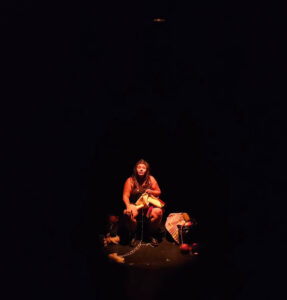Upon entering Neptune’s Studio Theatre today I was greeted by the familiar voice of critically acclaimed Nova Scotian actor/director/playwright and co-Artistic Director of 2b Theatre Christian Barry over the sound system saying, “I am Christian Barry and I’m looking for the audience of tomorrow.” The “Knowledge Café” that was facilitated at the Studio Theatre May 16th, 2009 by Secret Theatre’s Dustin Scott Harvey and Eastern Front Theatre Artistic Producer Scott Burke provided an open forum for Nova Scotian artists to voice their visions of the future for theatre in Halifax. It was a place for realists and dreamers to unite, a place for all the barriers that threaten to limit our goals to be examined and to generate creative ideas on how to overcome any obstacle that stands in our way of success.
The “Knowledge Café” was small in numbers, but it felt like the beginning of a much larger movement, and incited some truly fantastic and, I think, much needed discussion about the creation of a big, bright future filled with YES for theatre in this province. It has been difficult for me to effectively articulate my dreams and visions for Nova Scotia’s theatrical future, which has been a vision that has danced whimsically across my imagination for the past four years, because I have not existed in the hub of Halifax’s theatre community for quite a number of years. I know many of the artists working in the province, but while I have been in school and in Toronto, I have not gotten the opportunity to meet all the people I would like to meet, or to speak with some of the provinces biggest visionaries and the people who are making, fostering and developing theatre right here right now. Throughout the next eighteen weeks, I hope to do just that, and to bring all my readers along for the ride.
We began the morning listening to an audio segment where Christian Barry, Garry Williams and Tara Patriquin went out into the community and interviewed people on the street who did not frequent the theatre and asked them what type of theatre they would attend if it was available to them. The answers were at once disheartening and illuminating and filled me with the sense that a large portion of Nova Scotians have a very limited perception of not only what theatre is, but more important, what theatre can be. While this initially seems both daunting and tragic, the potential for the right projects to enter these people’s lives and to utterly transform the way they connect to the idea of “theatre” is invigorating. It is a challenge I sincerely hope we are all willing to accept with one hundred percent commitment. How do you bring the theatre to the people?
It is about marketing. It is about making the theatre as natural to people as going to the movies or the hockey game. It is about making theatre affordable. It is about ensuring that the buildings that house the theatre are important, vital fixtures in our community. As Louisa Adamson asserted, the theatre spaces should not be intimidating, but friendly and inviting places where patrons feel comfortable and a sense of belonging. It’s about creating hybrid performances that meld theatre, dance, music and visual art to cross pollinate the audiences and introduce various art forms to a wider array of people in an organic way. It is about strategically marketing shows to the demographics that are most likely to be inspired, interested, and invigorated by the material and insuring that press releases and media articulate the shows clearly in a way people with a limited exposure to drama can understand. It is about not allowing the promotion of one show to dominate over all the others. It is about the various theatre companies in this city supporting one another and not seeing the Nova Scotian audience as being “divided,” but as expanding with each new show that is produced. Andrea Ritchie, I think, hit the nail on the head when she said that the people who attend theatre in Nova Scotia are the people who feel that they are connected to the theatre, the people who feel like they are in the theatre community but, theatre is made for the people, the theatre relies on its audience, it is not an exclusive club, but something that everyone, regardless of their profession, their ethnicity, age, race, religion or life experience has the choice to partake in. Therefore, we have a responsibility to expand the network of people who feel as though they are connected to the theatre community.
I have a vision of a Halifax that is home to at least twenty professional theatre companies, each with adequate space to produce their various seasons, to rehearse, and to house touring shows from elsewhere. I have a vision of Halifax being a theatre center where indigenous work is fostered and developed, is toured and shared with the rest of the country, and where artists from other cities can come to work in collaboration, to share their work, to generate ideas, excitement, and share their knowledge and expertise. I have a vision of a Halifax where playwrights can live and work as playwrights and not just survive, but thrive. I have a vision of coorperately run theatre spaces where something theatrical is happening every evening, 365 days a year- whether it’s a play, improv, live music, sketch, comedy or dance. I have a vision of a Halifax where local actors have a plethora of choices available to them. I have a vision of a Neptune Theatre that is dedicated to its community, and which acts as a springboard of opportunity for the bright, talented, superstars of the future. I have a vision of Halifax where people go to the theatre. We are on our way.
As a final boost of optimism, I am not sure how much I am at liberty to discuss, but I have heard murmurings of a number of new theatre spaces in Halifax “in development” even as I type these very words. This is supremely exciting and no doubt will usher in a new, empowered era of theatre making in this city. Although I won’t get into the specifics in case such things land me in hot trouble, I will say that apparently the “Space (or lack thereof) issue” is on the radar of all the people who should be aware of it, and it looks promising that the powers that be will take the active steps toward addressing it and finding soultions.
In all, it seems to me that as Toronto’s theatre community is obviously on the brink of something extraordinary, so too does Halifax’s theatre community seem to be bubbling up in that same way. It is an exciting time to be a Canadian theatre practitioner. I encourage you all to involve yourselves in these sorts of discussions whenever the opportunity presents itself to you. Make your voice heard. Share your dreams. Take ownership. We’re standing on the precipice. I can feel it. Hang on!
The “Knowledge Café” was small in numbers, but it felt like the beginning of a much larger movement, and incited some truly fantastic and, I think, much needed discussion about the creation of a big, bright future filled with YES for theatre in this province. It has been difficult for me to effectively articulate my dreams and visions for Nova Scotia’s theatrical future, which has been a vision that has danced whimsically across my imagination for the past four years, because I have not existed in the hub of Halifax’s theatre community for quite a number of years. I know many of the artists working in the province, but while I have been in school and in Toronto, I have not gotten the opportunity to meet all the people I would like to meet, or to speak with some of the provinces biggest visionaries and the people who are making, fostering and developing theatre right here right now. Throughout the next eighteen weeks, I hope to do just that, and to bring all my readers along for the ride.
We began the morning listening to an audio segment where Christian Barry, Garry Williams and Tara Patriquin went out into the community and interviewed people on the street who did not frequent the theatre and asked them what type of theatre they would attend if it was available to them. The answers were at once disheartening and illuminating and filled me with the sense that a large portion of Nova Scotians have a very limited perception of not only what theatre is, but more important, what theatre can be. While this initially seems both daunting and tragic, the potential for the right projects to enter these people’s lives and to utterly transform the way they connect to the idea of “theatre” is invigorating. It is a challenge I sincerely hope we are all willing to accept with one hundred percent commitment. How do you bring the theatre to the people?
It is about marketing. It is about making the theatre as natural to people as going to the movies or the hockey game. It is about making theatre affordable. It is about ensuring that the buildings that house the theatre are important, vital fixtures in our community. As Louisa Adamson asserted, the theatre spaces should not be intimidating, but friendly and inviting places where patrons feel comfortable and a sense of belonging. It’s about creating hybrid performances that meld theatre, dance, music and visual art to cross pollinate the audiences and introduce various art forms to a wider array of people in an organic way. It is about strategically marketing shows to the demographics that are most likely to be inspired, interested, and invigorated by the material and insuring that press releases and media articulate the shows clearly in a way people with a limited exposure to drama can understand. It is about not allowing the promotion of one show to dominate over all the others. It is about the various theatre companies in this city supporting one another and not seeing the Nova Scotian audience as being “divided,” but as expanding with each new show that is produced. Andrea Ritchie, I think, hit the nail on the head when she said that the people who attend theatre in Nova Scotia are the people who feel that they are connected to the theatre, the people who feel like they are in the theatre community but, theatre is made for the people, the theatre relies on its audience, it is not an exclusive club, but something that everyone, regardless of their profession, their ethnicity, age, race, religion or life experience has the choice to partake in. Therefore, we have a responsibility to expand the network of people who feel as though they are connected to the theatre community.
I have a vision of a Halifax that is home to at least twenty professional theatre companies, each with adequate space to produce their various seasons, to rehearse, and to house touring shows from elsewhere. I have a vision of Halifax being a theatre center where indigenous work is fostered and developed, is toured and shared with the rest of the country, and where artists from other cities can come to work in collaboration, to share their work, to generate ideas, excitement, and share their knowledge and expertise. I have a vision of a Halifax where playwrights can live and work as playwrights and not just survive, but thrive. I have a vision of coorperately run theatre spaces where something theatrical is happening every evening, 365 days a year- whether it’s a play, improv, live music, sketch, comedy or dance. I have a vision of a Halifax where local actors have a plethora of choices available to them. I have a vision of a Neptune Theatre that is dedicated to its community, and which acts as a springboard of opportunity for the bright, talented, superstars of the future. I have a vision of Halifax where people go to the theatre. We are on our way.
As a final boost of optimism, I am not sure how much I am at liberty to discuss, but I have heard murmurings of a number of new theatre spaces in Halifax “in development” even as I type these very words. This is supremely exciting and no doubt will usher in a new, empowered era of theatre making in this city. Although I won’t get into the specifics in case such things land me in hot trouble, I will say that apparently the “Space (or lack thereof) issue” is on the radar of all the people who should be aware of it, and it looks promising that the powers that be will take the active steps toward addressing it and finding soultions.
In all, it seems to me that as Toronto’s theatre community is obviously on the brink of something extraordinary, so too does Halifax’s theatre community seem to be bubbling up in that same way. It is an exciting time to be a Canadian theatre practitioner. I encourage you all to involve yourselves in these sorts of discussions whenever the opportunity presents itself to you. Make your voice heard. Share your dreams. Take ownership. We’re standing on the precipice. I can feel it. Hang on!






